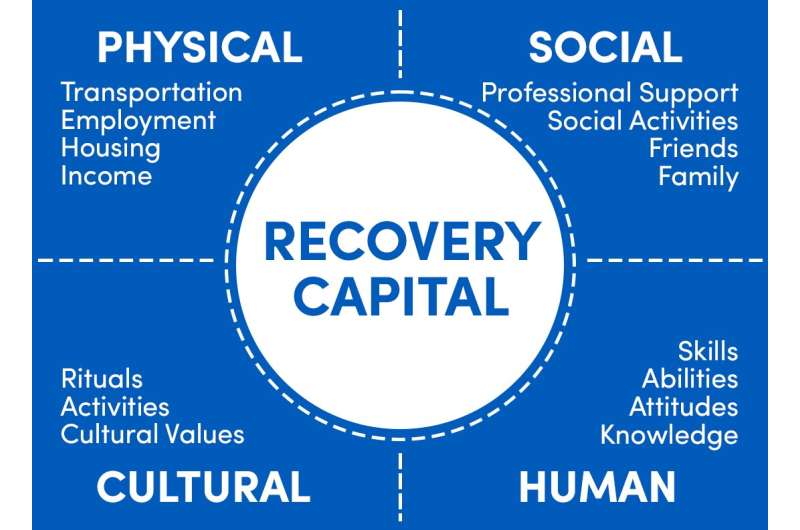This article has been reviewed according to Science X's editorial process and policies. Editors have highlighted the following attributes while ensuring the content's credibility:
fact-checked
peer-reviewed publication
trusted source
proofread
Social work researcher introduces a new tool for treating alcohol and drug addiction

A multidisciplinary team led by a University at Buffalo social work researcher has developed and tested a new assessment tool that has the potential to help people recover from alcohol and drug addiction.
The Multidimensional Inventory of Recovery Capital (MIRC)
, a project resulting from a roughly $408,000 grant in 2020 from the National Institute on Alcohol Abuse and Alcoholism, is a reliable measure of resources that contribute to an individual's successful
The MIRC is not the first such instrument of its kind created to help resolve alcohol and drug problems, but its robust design builds upon the full scope of recovery capital theory in ways that distinguish it from similar tools that have come before.
A study published in the latest issue of the journal Drug and Alcohol Dependence explains the team's process of developing and testing the MIRC.
People are not all equally equipped for success when they begin a recovery journey, and the unique set of life factors populating each individual's environment can either help or hinder their effort. Those collective life factors are known as recovery capital, a term for the different social, physical, human and cultural resources that help a person in their recovery attempt. Recovery capital includes everything from friends and family, money and stable housing, knowledge, health attributes and community-level resources.
Recovery capital shifts the recovery narrative from traditional ideas centered on willpower to a more holistic view. It's a conversation about access to resources, not motivation. But it's a two-sided coin. Although often viewed in terms of supporting elements, recovery capital also includes negative capital, or those factors that make recovery more difficult, such as family members who don't understand addiction.
Knowing the specific capital connected to the initial steps of recovery is critical, but accessing what's present, and absent, requires a reliable measure. And that's what the MIRC provides, according to Elizabeth Bowen, Ph.D., an associate professor in the UB School of Social Work (SSW) and the study's first author.
The MIRC is a tool that measures positive and negative factors within the four types of recovery capital (social, physical, human, and cultural).
"It's important to measure recovery capital so we can understand the inequities that influence recovery," says Bowen. "Without a good measure it's hard to quantify which groups have the most access to resources and which groups are likely to struggle.
"Ultimately, I'm interested in doing something to address those disparities, and the MIRC can provide the required momentum."
Bowen's research team developed the MIRC in three phases that started with a wide-ranging list of possible items that were shared with a group of 44 individuals who were either service providers or people in recovery.
"We wanted initial reaction to our questions," says Bowen. "We did a lot of tweaking and revising from the excellent feedback from phase one."
The team then tested a draft measure with a sample of 497 people in recovery from alcohol problems (either alcohol alone, or with other drugs). Psychometric testing, a standard method to determine suitability and reliability of the elements, suggested how the items performed and the differences displayed among the respondents.
"We made further changes to the measure following this phase, before testing a revised draft with a new sample of 482 participants," says Bowen. "That's how we arrived with the psychometric statistics showing that the MIRC is a measure of recovery capital with good reliability, validity and discrimination."
That final measure, or "inventory," as Bowen sometimes call it, is a novel tool, in lockstep with the tenets of recovery capital theory, that explores positive and negative capital outlined in the four categories.
"We also, most importantly, highlighted in our measure the voices of people in recovery," says Bowen. "We made every effort to use a sample in each testing phase that was racially, ethnically, economically and gender diverse, while also thinking about diversity in terms of recovery experience, such as people who have received treatment, those who have not, those who are abstinent and those who are not."
The MIRC is publicly available for download from the UB School of Social Work's website.
"I encourage those who can benefit from the MIRC to download a copy," says Bowen. "This can be a tool for reflection or self-assessment; a clinician working with people in recovery can use the MIRC as part of the assessment process; it can serve as a conversation-starter for social workers and clients showing strengths, weaknesses and where to go from here in helping people address their capital."
There is also utility for further study on recovery and recovery trajectories.
"I'm excited to have this measurement tool out there in the world so that we can assess recovery capital and begin to address existing inequities."
More information: Elizabeth Bowen et al, Development and psychometric properties of the Multidimensional Inventory of Recovery Capital (MIRC), Drug and Alcohol Dependence (2023). DOI: 10.1016/j.drugalcdep.2023.109875



















